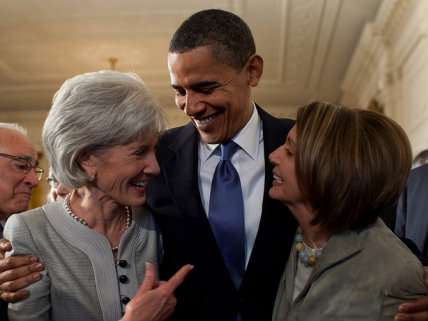Under Obamacare, People Must Be Broken of Their Preference for Choice

We have a new contender for most-telling-ever Obamacare quote this morning: "We have to break people away from the choice habit that everyone has." That's Marcus Merz, head of Minnesota health insurer PreferredOne, in a New York Times report on the increasing prevalence of narrow network health plans.
Merz is basically stating openly what the Obama administration won't, which is that Obamacare is intentionally designed to narrow consumer choice and plan design within the health insurance market. The Obama administration doesn't want to say this because it is bad politics generally, and also because President Obama specifically and repeatedly promised that, under the law, people would be able to keep their choice of health plans and doctors, not that they would be broken of their preference for medical choice. But the law's authors and administrators have a pretty good idea of what kind of health insurance they want you to have, and that's the kind of insurance that you're going to get.
"We're all trying to break away from this fixation on open access and broad networks," Merz continues. "We"—by which I mean the insurance industry—tried this before, in the 1990s, when narrow-network plans referred to as Health Maintenance Organizations were all the rage. It didn't go so well, and eventually insurers cut it out.
But this time it will be different, insurers tell The New York Times. Why? Because…look, it will just be different. Trust us.
Although a similar attempt to restrict choice failed in the early '90s, after opposition to H.M.O.s and managed care, insurers insist these efforts will not run into the same resistance because they are now working more closely with providers, and customers are more concerned about costs. "It's a new era," said Dr. Sam Ho, the chief medical officer for United Healthcare.
Others agree. "You're going to see this as a dominant strategy," said Jeff Hoffman, who works closely with hospitals for Kurt Salmon, a consulting firm.
And if insurance executives say it, well, it must be true, and the liberal health wonks who back Obamacare would never think to question them. Truly it is a new era.
Yes, obviously this time it is different, in the sense that there is now a mandate to buy insurance and a bevy of administration-enforced rules and regulations about what sorts of plans, covering what sorts of procedures, can be sold through the exchanges. Hence the necessary "breaking of the choice habit." The law is written in such a way as to severely constrain and, as a result, practically predetermine which sorts of plans are available at any given price point. Insurers all end up offering what amounts to a few standard models, plus or minus a handful of decorative touches.
Given the limited choices and the requirement to buy, then, it's not really surprising that many customers end up choosing cheaper plans—and the narrow networks that inevitably go along with them. Or, as Karen Ignani, the head of the insurance industry trade group America's Health Insurance Plans, says in the article's second best quote, "What we're finding is individuals are experiencing a preference for affordability."
It's worth stopping for a moment to admire that quote. It is a minor masterpiece of lobbying communications nothing-speak. It is almost entirely removed from action or accountability. It's like she's talking about a new observational study on cloud formations.
But people shopping for insurance under Obamacare are not simply experiencing some mysterious condition. They are being required, by law, to purchase a product, and then deciding that for the money they have spent—which in many cases is merely a fraction of the total cost, the rest of which is being picked up by taxpayers—they do not like what they are getting in return. That is why the choice habit must be broken. We can't have people's quirky, complicated personal tastes and preferences messing up our perfect system.


Show Comments (120)